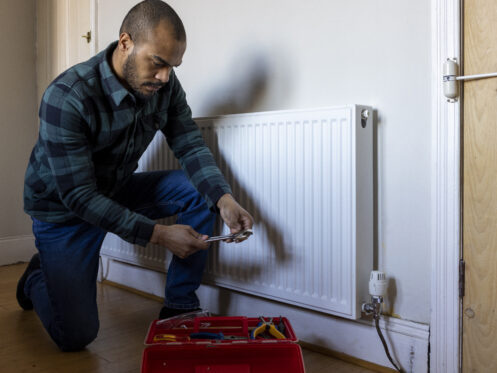If you’re looking to replace your existing heating or are building a new home and need to install an HVAC system from scratch, you have a few choices. Gas furnaces, electric furnaces, and heat pumps can all be good options in different situations, but all three have advantages and drawbacks that you should consider. In this article, we’ll compare the three options side by side so that you can better understand which one is the right choice for your home.
Understanding How Heat Pumps and Furnaces Work
Gas furnaces burn natural gas (or propane) to produce heat. This heat raises the temperature of the air flowing over the unit’s metal heat exchanger. Specifically, hot combustion fumes from the burner flames flow through the heat exchanger. Since metal is an extremely good heat conductor, the heat exchanger constantly absorbs heat as the fumes flow through it. As cooler air from inside the home is drawn into the furnace and over the heat exchanger, the heat naturally flows out of the metal so that the air becomes much warmer.
Electric furnaces work using multiple electric resistance coils. As electricity flows through the metal wires in the coils, they instantly become extremely hot and start glowing, similar to what happens to the wiring inside your toaster when you turn it on. Like gas furnaces, electric furnaces have a blower that draws cooler air into the unit through the ductwork. When the furnace is on, heat constantly radiates from the metal coils and into the air. The blower then moves the heat through the supply ducts and pushes it out of the vents in each room.
Although heat pumps also run on electricity, they don’t just transform electrical energy into heat. Instead, the electricity facilitates a heat transfer process that moves heat from outside into the building. This is done using a chemical refrigerant that is extremely efficient at capturing heat from the surrounding air. The fan in the heat pump blows air over a coil filled with cold refrigerant, which results in heat energy flowing out of the air and being absorbed by the refrigerant. The warm refrigerant then passes through an expansion valve, which essentially causes it to boil and transform into a superheated gas. The gas then moves through the system into the coil in the indoor air handler unit. As the blower moves cooler air over the coil, the refrigerant releases the stored heat into the air.
Electric Furnace Pros and Cons
Electric furnaces are generally never a good option in places with freezing winters, but they can definitely be a decent option in the Texas Gulf Coast region. In cold climates, an electric furnace needs to run almost constantly to effectively heat a home and uses a significant amount of energy. In the Rockport area, this really isn’t an issue since any type of heating unit will typically only run a bit at night and in the morning.
The main advantage of opting for an electric furnace is that it will cost you less upfront than either a gas furnace or a heat pump. The maintenance requirements for an electric furnace also tend to be slightly lower, and these units typically don’t need as many repairs since they have fewer components. Another great thing about electric furnaces is that they usually have a longer lifespan and can work effectively for at least 20 years, if not much longer.
The biggest drawback to electric furnaces is that they will always be the most expensive option to operate. These units are more energy efficient than gas furnaces, but your heating costs will be a bit higher simply because electricity costs more than natural gas. If you compare an electric furnace to a heat pump, on the other hand, the furnace will use around three times as much electricity. Nonetheless, the lower upfront cost and longer lifespan somewhat help to balance out against the higher energy usage.
Heat Pumps Pros and Cons
Heat pumps are far and away the most energy-efficient option for heating a home, and this is especially true in our area. In colder climates, heat pumps aren’t always a great option since their effectiveness and energy efficiency decrease as the outdoor air temperature drops. A heat pump will always work best in temperatures of 40 F or higher, which is why they are a top option for our area. The high energy efficiency of a heat pump also means it is the most environmentally friendly of all heating options.
Heat pumps are typically the most expensive HVAC system to install, depending on the unit’s energy-efficiency rating. However, it is misleading to compare the cost of a heat pump to that of a gas or electric furnace because heat pumps provide both heating and air conditioning. If you compare a heat pump to the cost of installing both a furnace and a central AC unit, a heat pump will typically be a few thousand dollars cheaper. Nonetheless, if you already have a central AC unit that isn’t very old and works well, you may be better off waiting to install a heat pump until you need to replace your AC.
Heat pumps do have a few drawbacks. Namely, they have a shorter lifespan than furnaces and central AC units. They also need to be inspected and serviced more often and can be more prone to breaking down or needing repairs. This is because heat pumps run almost year-round instead of only for part of the year. Since a heat pump in our area will get so much use keeping your home cool throughout the hot, humid months, it will usually only last for around 10 to 15 years.
Gas Furnace Pros and Cons
Gas furnaces are extremely effective and provide lots of heat at once, so they are a great option in cold climates. A gas furnace isn’t necessarily a bad choice for our region, but there also aren’t that many times of the year when you need that much heat. On the other hand, a gas furnace will cost less upfront than a heat pump while keeping your heating costs lower than if you had an electric furnace.
The main issue with gas furnaces is that they need to be vented to allow the combustion fumes to safely flow out of the home. This can be a safety issue as, if the vent gets clogged, carbon monoxide and other harmful gases can escape and leak inside. This can also happen if the heat exchanger cracks or is damaged. There is also always the risk of a gas leak, but this is true if you have any other gas-burning appliances in your home.
At Sigwald Service Co., we have 40+ years of experience providing exceptional heating and air conditioning services throughout the Rockport area. We install heat pumps and furnaces, and financing is available for your new unit on approved credit. We also offer expert heating and AC maintenance and repairs, so call Sigwald Service Co. today for all your home comfort needs.






